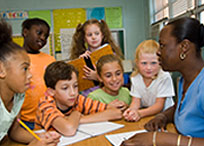Français |

MY CHILD IN SCHOOL
MY CHILD IN SCHOOL – Informed Parent, Involved Parent
GRADE 1: FRANÇAIS
What my child is learning
In Grade 1, your child learns to:
- grasp the main ideas of French language messages they hear or read with the help of actions, pictures, and links to personal experiences
- understand and follow directions in French
- use actions, drawings, words and simple sentences to communicate his or her ideas about what he or she has seen and heard in French
- recognize that there are different reasons for writing things down
- communicate ideas and information in French:
- by correctly using words for classroom routines and themes when speaking
- by repeating and using simple sentences correctly
- by using words learned in class and sentences based on a model sentence
- by using word lists, checking word order and space between letters and asking for help when he or she writes down ideas
To find out more about what your child is learning, talk to their teacher. You may also refer to the Language Arts Practices: Orientation Guide for information regarding the program’s guiding principles and recommended practices.
How your child is assessed
Your child’s progress in Français will be reported in three areas and may address the following questions:
- Comprehension (Reading, Listening, Viewing)
Does your child understand the general idea of a short piece of writing with pictures that has been read out loud?
Does your child use actions, drawings and words to respond to a short piece of writing with pictures that has been read out loud?
How well does your child follow simple directions?
- Communication (Writing, Speaking, Representing)
Does your child communicate using familiar words about school routine?
Does your child participate in activities to learn words for a particular theme?
Does your child express ideas in writing using a model sentence?
- Critical Thinking
Does your child make connections between what is being learned and previous knowledge and experiences?
The teacher will report on your child’s progress three times a year. The information from each report helps you to support your child’s learning. You can use it to talk with your child and your child’s teacher about results, strengths, challenges and what your child will be doing next.
Resources
- Winnipeg Public Library: Features information and programming devoted to Early Literacy as well as access to several databases of digital storybooks for a variety of grade levels. To access French storybooks, click on the Tumble Book Library link, then go to the top right hand corner of the page and change the language to "Français". The St. Boniface Library features the WPL’s largest collection of physical French language resources and offers onsite activities and services in French.
- Lalilo: Learners following this program develop their phonological awareness skills while gradually learning the fundamentals of reading. Families may opt to have their children study in French or in English upon opening a free parent account.
- Boukili: With a free account, families may access this rich collection of interactive French storybooks, organized by skill level. Boukili is also available as a smartphone app.
- Several Canadian French language media companies have developed websites for younger learners. Zone des petits (Radio-Canada), Mini-TFO (TFO), and Coucou (Télé-Québec) feature games, songs, videos and animated stories for growing students’ French language vocabulary. TFO and Radio-Canada also offer smartphone apps appropriate for this age group.
- Idéllo: Families signing up for a free account can access this online platform of French language multimedia content and learning activities, including lesson plans.
- WordReference Bilingual Dictionary: A quick reference tool including pronunciation files.
- Farlex Pronunciation Dictionary: This tool allows users to hear French terms alone and in context. Includes an offline dictionary: iOS app, Android app.
- DREF (Direction des ressources éducatives françaises): Registered home-schooling families with verified accounts may access this library of French language educational resources, including books, board games, and digital tools.
- Please visit the My Learning at Home – Immersion website for links to more French language resources.


